Kenya's makeshift goldmines: Can Fairtrade do for our jewellery what it did for our bananas?
In Kenya’s makeshift gold mines, men and women scrabble to make a living in appalling conditions. It is crying out for a code of conduct, which is where Fairtrade has stepped in, as James Ashton reports
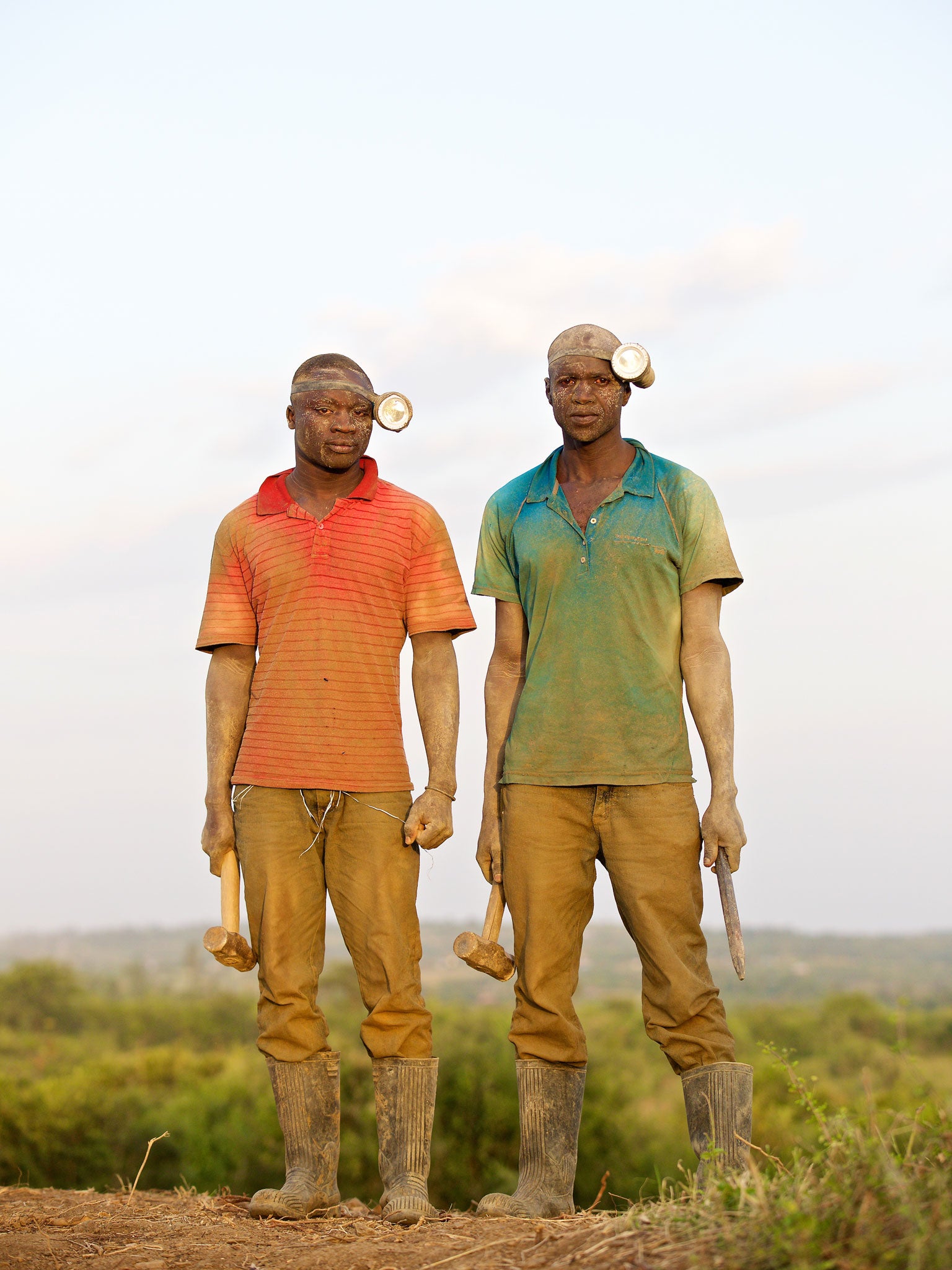
Your support helps us to tell the story
From reproductive rights to climate change to Big Tech, The Independent is on the ground when the story is developing. Whether it's investigating the financials of Elon Musk's pro-Trump PAC or producing our latest documentary, 'The A Word', which shines a light on the American women fighting for reproductive rights, we know how important it is to parse out the facts from the messaging.
At such a critical moment in US history, we need reporters on the ground. Your donation allows us to keep sending journalists to speak to both sides of the story.
The Independent is trusted by Americans across the entire political spectrum. And unlike many other quality news outlets, we choose not to lock Americans out of our reporting and analysis with paywalls. We believe quality journalism should be available to everyone, paid for by those who can afford it.
Your support makes all the difference.Suddenly, a commotion breaks out. The seven men who have just clambered up the ladder out of the soupy darkness of a hole, four foot by three, are dividing the day's spoils. But the near-toothless old man whose job is to supervise proceedings senses something is wrong.
It is early afternoon and scorching hot in this corner of south-west Kenya. You only have to lean over the top of the mine shaft to get a sense of the steamy heat a hundred feet below. Imagine a geothermal kettle has just boiled.
The newly emerged gang members, well-muscled from the rocks they daily haul, blinking in the light, their heads adorned with lamps – but not safety helmets –are coated in dust and sweat. Their reward for six hours of hard labour in searing heat is not cash, but a small pile of stones, similar to those stacked nearby in 50kg bags. Contained within those stones is the object of desire for miners down the centuries: particles of gold.
Clinton, a young man of not much more than 20, is the cause of the pit-side fracas. Clad in a brown T-shirt and jeans tied with string, he stands gingerly to one side. When the old man calls him out, the reason soon becomes obvious. Reluctantly he sits down and starts picking jagged rocks the size of walnuts from the tops of his wellington boots, placing them on an empty sack on the ground in front of him. The volume of jeering goes up, until Clinton, now grinning sheepishly, steps from his boots and pours out a pile of rubble that he planned to snaffle home to supplement his pay.
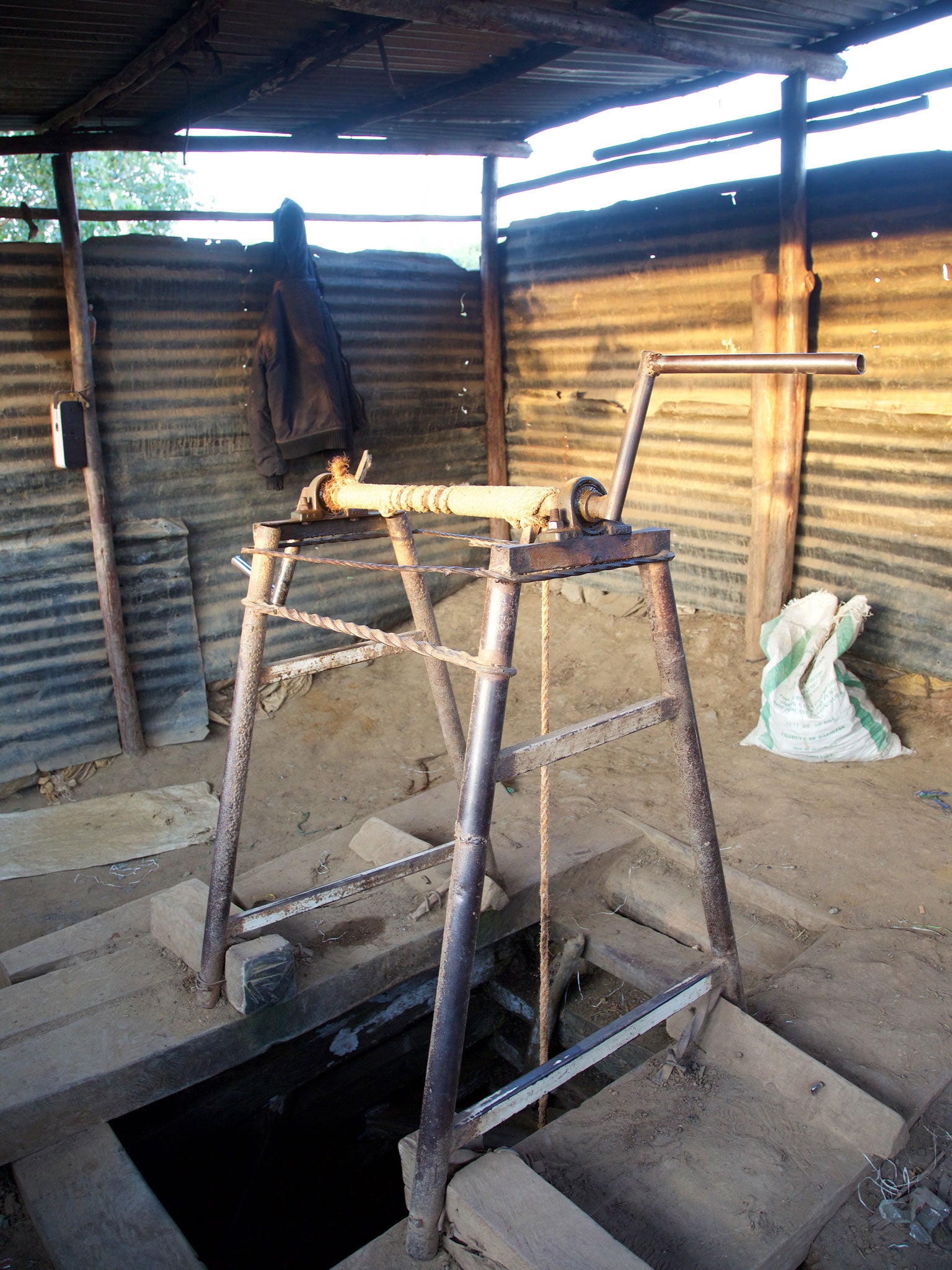
Welcome to the world of small-scale mining, where specks of precious metal help keep communities above the breadline. It is dirty and dangerous work, but millions of people in Africa and Latin America mine by hand seams that would not be economically viable for multinational corporations to prospect. The industry – which accounts for 15 per cent of the world's gold production – is informal at best, illegal at worst. On humanitarian grounds alone, it is crying out for a code of conduct, which is where Fairtrade has stepped in. Could it do for the workers in the makeshift goldmines of Kenya what it has done for workers in tea, coffee, bananas and other developing-world industries?
At the other side of the site, I meet Moses, sitting in a tin shack unremarkable other than for the acrid smell of mercury fumes that rise from a small pot on his porch. If Clinton is the muscle, Moses is the money, a local trader offering instant cash for whatever gold has been prised from the baked earth that day.
A woman enters, dropping into a bowl on his desk a glinting pea of gold. Moses' eyes narrow as he weighs it, holding his calculator over the scales to shield the LCD display from the sun. At > 0.21 grammes, the calculator flashes up 651 Kenyan shillings. He pulls three 200-shilling notes from his drawer – worth about £3.80 – and proffers them. The woman hits the roof – literally – banging the ceiling in protest at his offer, before snatching back her crumb of gold and darting outside.
"She is going to look for other buyers," Moses shrugs. A few minutes later she returns, downcast, to accept his offer. But Moses is not the villain of the piece, just another middle man in a precarious supply chain, loaded with risk, where everyone is trying to take a cut. Ten years in the job, he twice-monthly travels 200 miles from the mine, in the town of Migori, to the Kenyan capital Nairobi, where whatever gold he has purchased will fetch a better price.
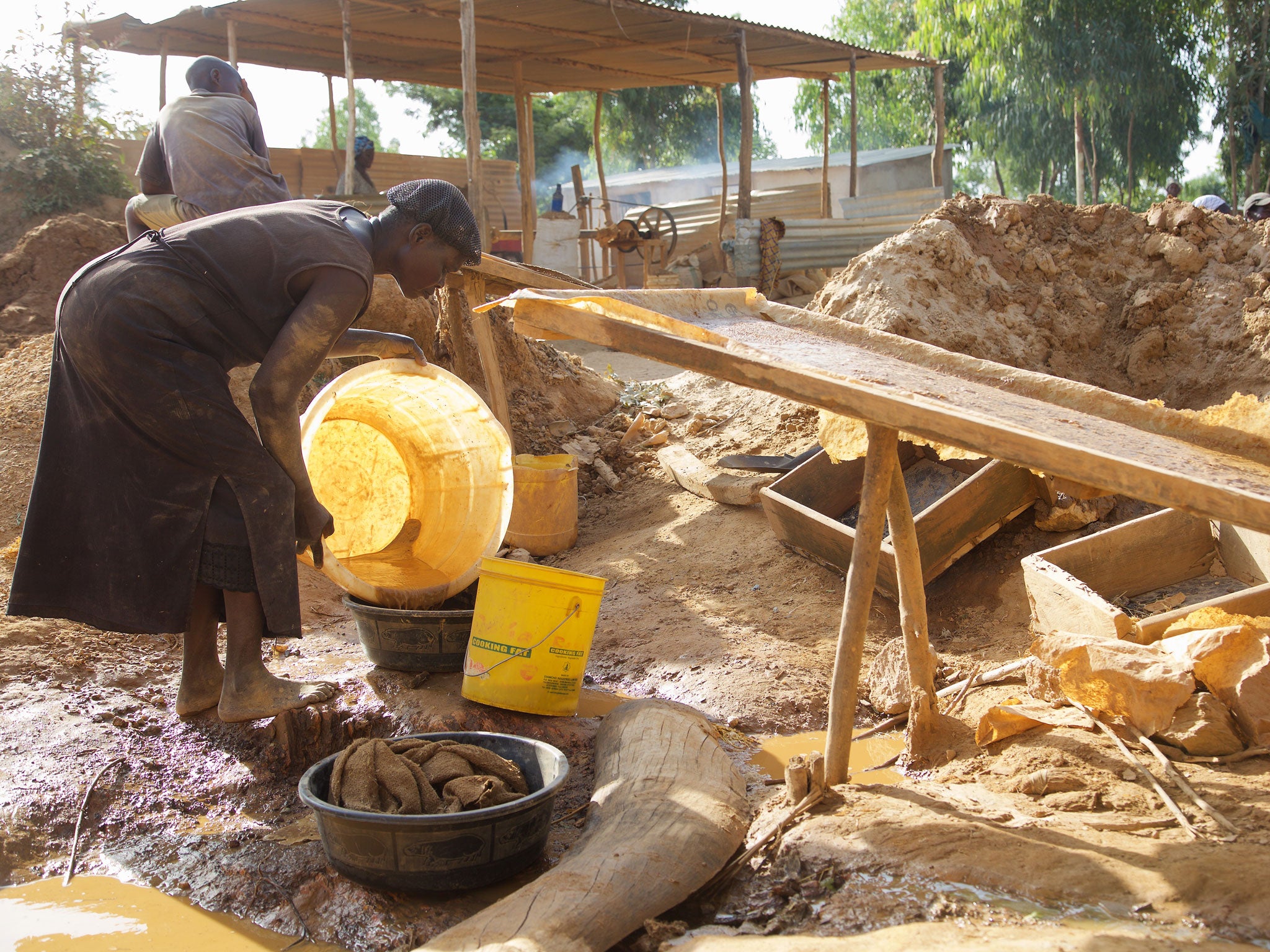
There are stories like these all over the goldfield, a hive of activity with brown rubble piled everywhere and a shanty town on one side. Women bend double to wash pots and men usher donkeys down to the stream to fetch water.
Some of the rocks winched up from the pit are smashed by Jerry, 22, dressed in dark pin-stripe trousers, who used to be in construction but now estimates he hammers through 10 "long ones" – 50kg sacks – a day. From there, the "harvest", as some call it, is further processed in a crusher – an industrial tumble-drier hooked up to a generator that operates at ear-bursting volume. By now reduced to gravel, it is rinsed by, among others, Esther, 40, a mother of 10. "There is no other job for me," she says.
Next is the panning, something most people know of from historical footage of gold rushes. What is less well-known is that the slurry in the pan is then mixed with mercury, which amalgamates with the gold and sinks to the bottom. This is done often with bare hands and often by women, unaware of the toxicity of what they are handling and its impact on, among other things, unborn children. The mercury is then burned off – which in unregulated mines often means the fumes are inhaled, which over time damages the brain and kidneys, and causes irreversible neurological damage.
This is not the only danger. I meet Josef, 53, who seems nimble as a child when hauling himself out of the pit. Only when we walk back to the home he shares with his wife and 12 children is his limp obvious. It is a reminder of the time in 1999 when he was buried six metres deep, for half an hour, when a pit wall collapsed on his chest and leg. Yet unstable mine shafts are not the biggest killer. That deathly honour goes to the carbon-monoxide poisoning caused by the small water pumps used to clear floods deep below ground, often with inadequate ventilation.
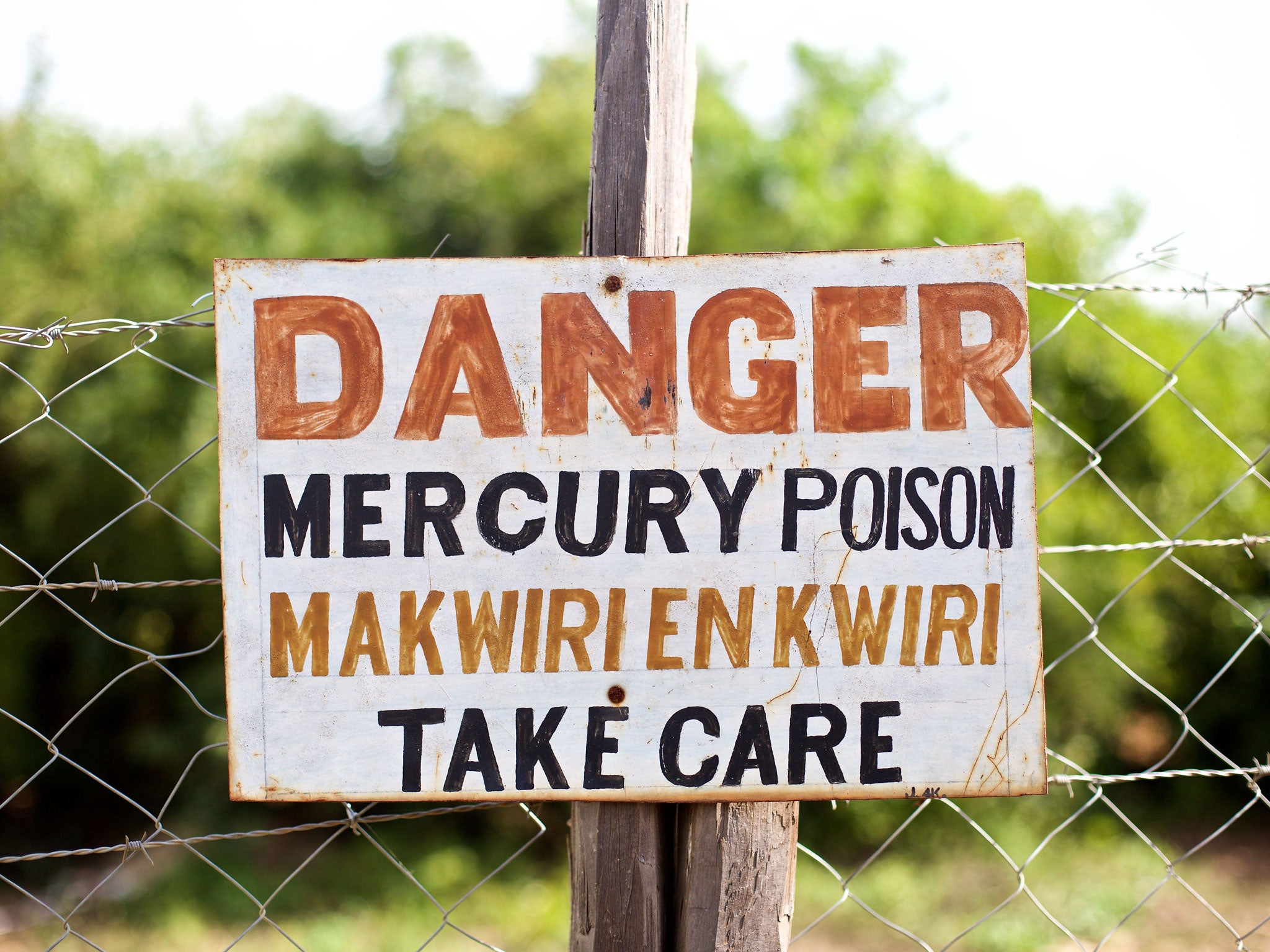
In times of trouble, gold shines bright, and investor interest surged during the global financial crisis. Annual gold demand averages 4,400 tonnes, up over a third in a decade. Its safe-haven status saw the price surge to an all-time high of $1,921.18 per ounce in 2011, but slip as the world economy recovered and investors sought out riskier assets once again. It now stands close to $1,100. But the yellow stuff is not just for trading. Half is bought for jewellery. India is a big buyer, but demand has stepped up most in China, where sales have more than doubled in the past five years.
There has long been a suspicion that the industry could do more to make its supply chain transparent. In 2012, the World Gold Council, which speaks for 18 of the largest producers operating in more than 40 countries, launched its conflict-free gold standard, described by John Mulligan, head of member and investor relations, as "a common approach by which gold producers can assess and provide assurance that their gold has been extracted in a manner that does not cause, support or benefit unlawful armed conflict or contribute to serious human rights abuses or breaches of international humanitarian law". There is the work of the Responsible Jewellery Council too, but still occasional reports emerge of gold mining jumbled up with money-laundering in Switzerland or chicanery in Dubai.
The first gold rush in the resource-rich arc around Africa's Lake Victoria dates back a century, but much of the regulated mining activity in Kenya ceased with the end of British rule in 1963. Many of the mining laws still date back to colonial times, with little provision made for small-scale miners. This harms efforts by local operators to borrow money to fund excavation. It also hits their bargaining power, so that the gold they sell often trades at a steep discount to global prices. All of this of course negatively impacts on the funds available to invest in safety equipment or improved conditions.
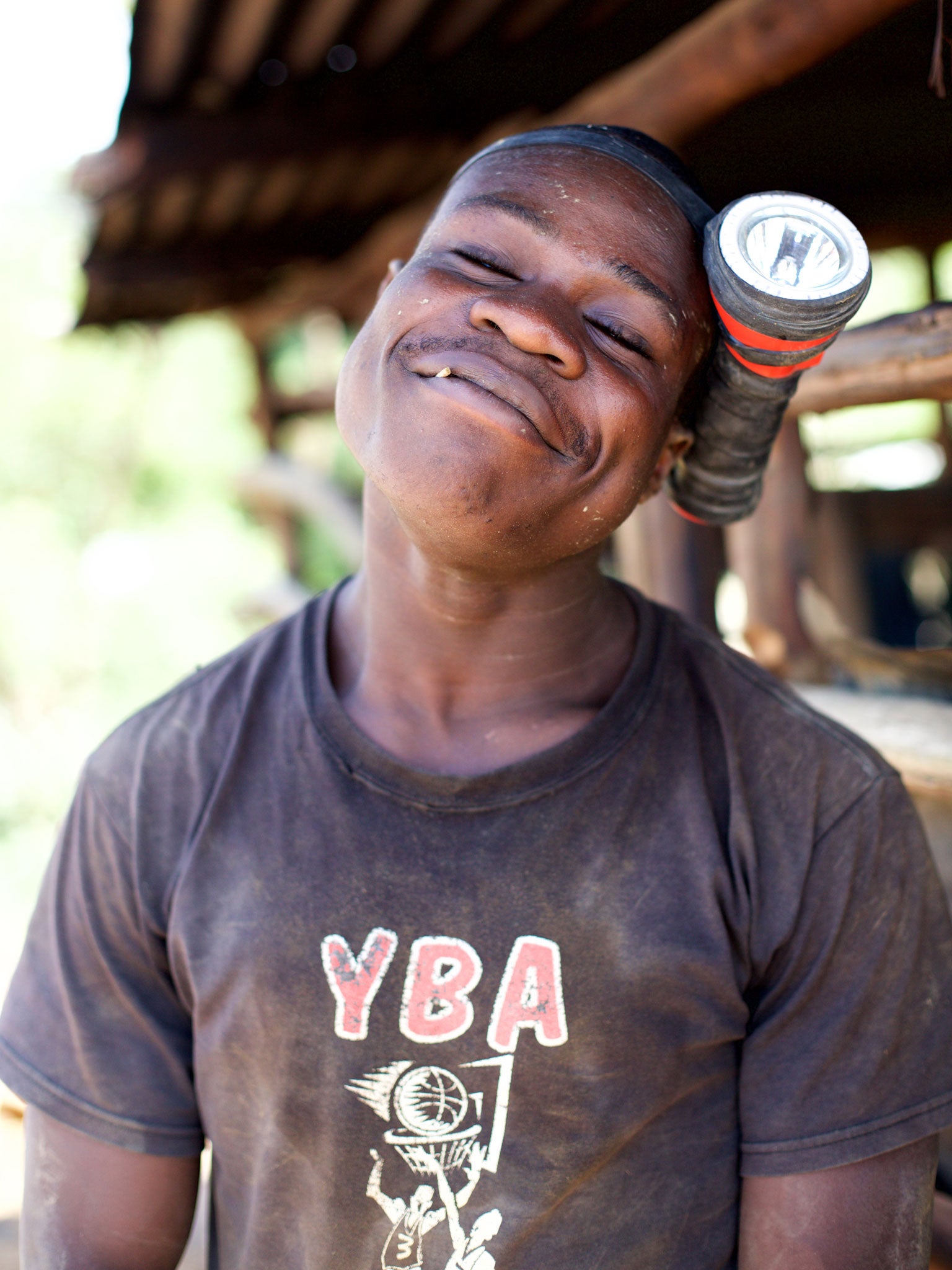
Improved regulation would help, something the WGC favours. "We advocate the increased formalisation of the sector so as to make it less vulnerable to exploitation by armed or organised criminal groups, to improve safety and environmental standards, and to combat the use of child labour," says Mulligan.
Bismarck and George learnt about mining almost before they could walk, washing out the hessian sacks that were used to gather rocks. Both of their fathers mined together in Migori. They were close: as two diabetics, they often shared insulin tablets. A generation on, little has changed.
Bismarck, a bull of a man in chinos and striped polo shirt and carrying a black briefcase, believes much more should change, however. When he is not directing operations out in at the gold field, he is directing from the pulpit, booming the word of the Lord into a microphone on Sundays as the local pastor. While women kneel with their heads on the concrete floor, men raise their palms high to heaven and children sit meekly on benches at the back.
George and Bismarck have for the past nine months been overseeing the excavation of a new mine, one that it is hoped will become the first Fairtrade mine in Kenya, and one of the first in Africa, provided that it meets the organisation's standards once it opens. They are leaders of Microdepro, a local co-operative that has 31 members. Production might start at the end of the year, assuming they encounter a vein of quartz by then.
Bismarck displays only a hint of frustration at the delay. He explains that they would likely have found a suitable vein already, had they cut corners as other local operators do. "But they don't consider much the safety of miners," he says.
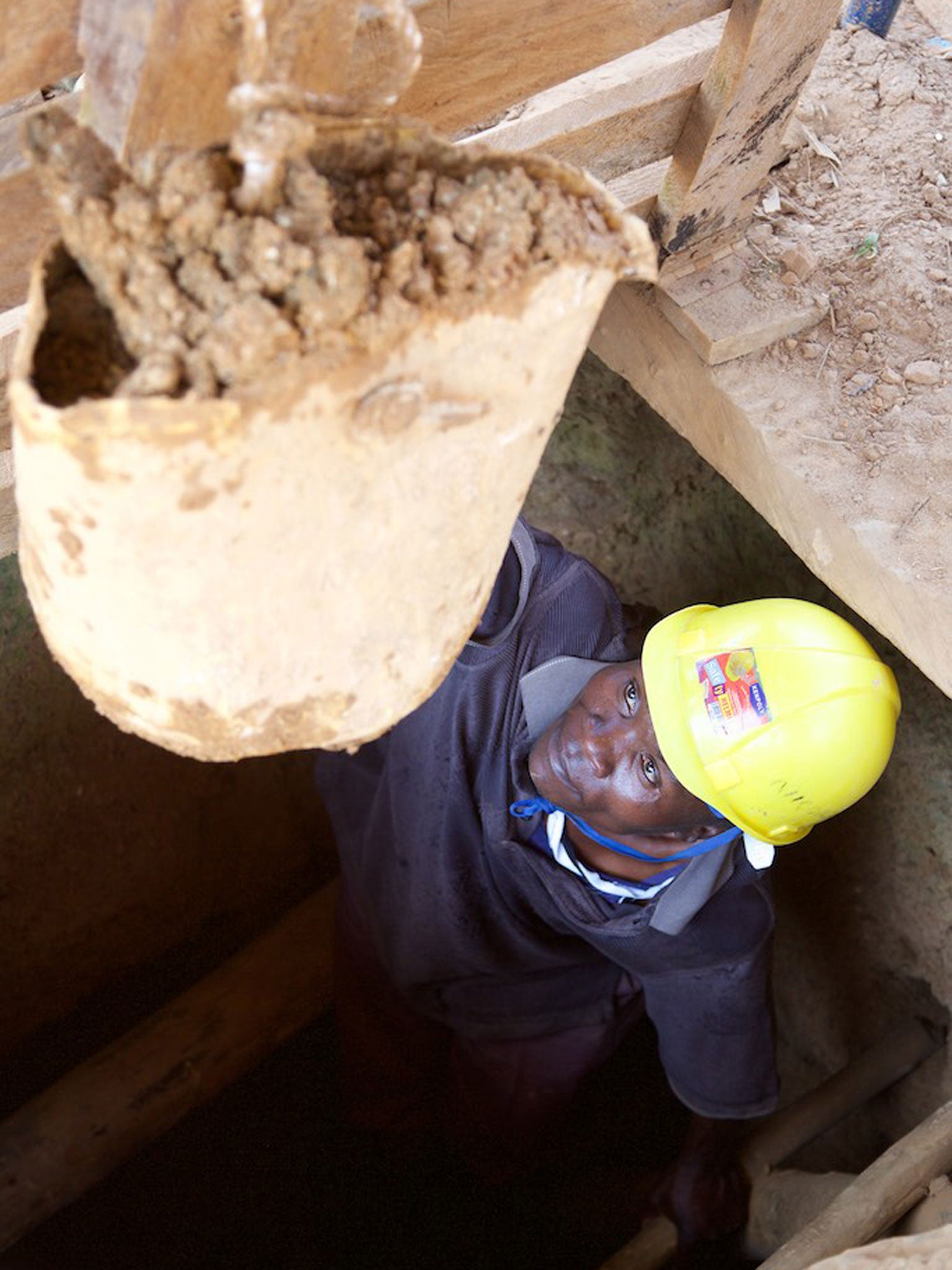
You can see the difference compared to nearby mines. The pit is wider, the opening timbered around the edge to prevent collapse. Through a thicket of trees are concrete troughs for sluicing, so mercury will not seep out into the countryside. When they begin panning, the women will wear safety gloves. There is even talk of hiring a centrifuge, meaning the co-operative could one day go mercury-free. But that is jumping ahead.
The Fairtrade Foundation, has applied its ethical brand to everything from coffee to clothing. The question is, can it enter the gold market, guarantee higher prices for miners in exchange for better standards, shine a light on the supply chain, and generate international demand for responsibly-sourced jewellery?
This may sound a tough prospect, but, points out Michael Gidney, Fairtrade's bespectacled chief executive: "People said we would never do it with bananas; they said we could never make an alternative supply chain. I can't think of a single one of the sectors we currently operate in that people didn't initially doubt us on."
Gidney first came to Africa as a young teacher in the wake of Live Aid, suspecting the continent was neither basket case nor charity case, and it is a goal of his to have a Fairtrade mining presence in the continent. It is not the first in the world though; Fairtrade gold has been available in the UK under a pilot scheme from a Peruvian mine since 2011 and has signed up 100 licensees. Its efforts to expand into Africa follow a Comic Relief-funded scheme that trained workers at nine mines in Kenya, Uganda and Tanzania in areas such as child labour, safety and environmental damage.
As with any new market, Fairtrade liaises with knowledgeable, sector- relevant partners. Accompanying Gidney on this trip is Alan Frampton, the owner of Cred Jewellery, Britain's first Fairtrade gold importer. His slicked-back hair gives the air of someone more at home at the golf club, but Frampton knows Africa well from the family business, now sold, that used to import cut flowers from there to the UK.
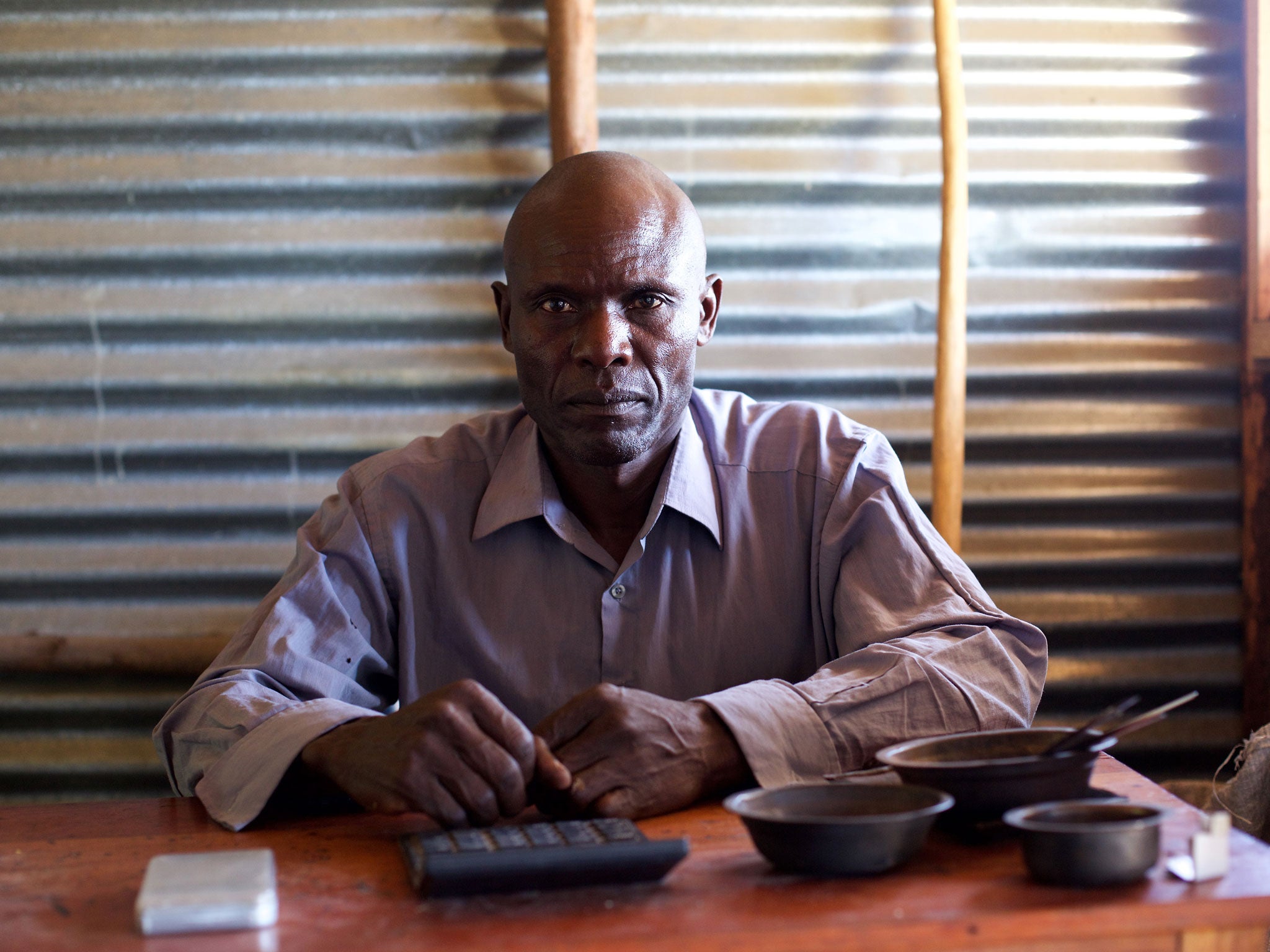
He bought Cred a few years ago with the idea of scaling it up. It had imported the first ethical gold from Colombia a decade earlier, pioneering the idea of a fully traceable supply chain. Cred boasts that its gold can be tracked gramme for gramme, right through assaying, refining, manufacturing and into the cabinet on the high street. Awareness is still low, but it's growing, and sales are up. Turnover rose 64 per cent at its London and Chichester stores in the first quarter of the year.
"Mostly it has been bridal sales," says Frampton, over a beer back at the hotel. "I think when people buy a wedding ring it is a symbol of love and trust." This is the market that Fairtrade is looking to, in the belief that couples pledging their love to one other would like to do so with a ring of pristine provenance – and will be willing to pay a little bit more for that peace of mind. So far the organisation has just a tiny slice of the action, with Fairtrade gold accounting for about 60kg of the five tonnes of fresh gold coming into the UK every year.
Back at church, his sermon over, Bismarck steps down from the pulpit, besides which hangs a sign with the words: "Not by power, nor by might, but by my spirit, says the Lord."
His co-operative must pay 40 per cent of its output to the mine's landlord, who keeps contracts short and reserves the right to renegotiate. To pay for equipment hire, miners often have to do a shift for nothing. Bismarck's vision is of a collective that can plan for the future, lend money to its members – and pay miners in cash, not rubble – and have above-ground work available for when it is too wet to risk going down the mine. If they get really organised, in regional groups, the miners might even gain more negotiating power with traders or site owners. It is not just the miners and their families that he hopes will benefit. "When the pits are productive, every other business thrives," he says. "When they are not, there is no money circulating. It is important for the community. Everything hangs on it."
Join our commenting forum
Join thought-provoking conversations, follow other Independent readers and see their replies
Comments